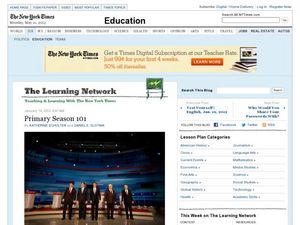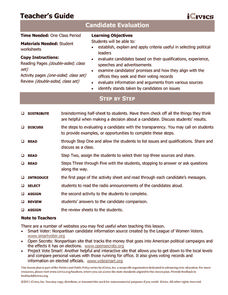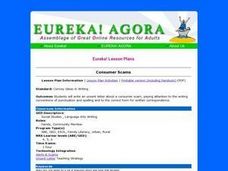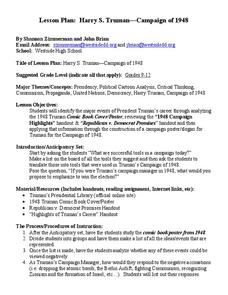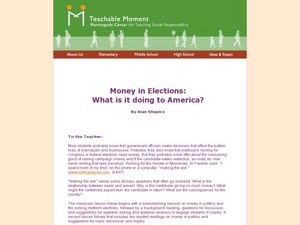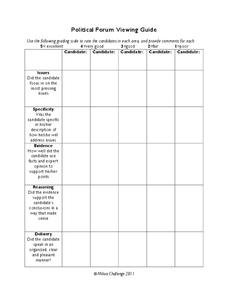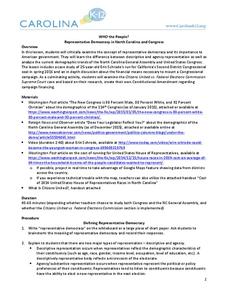National Endowment for the Humanities
The 1828 Campaign of Andrew Jackson: Expansion of the Voting Base
Students give examples to indicate how the franchise was extended and limited in the first half of the 19th century, and cite some differences in the newly enfranchised population that could affect the way they would vote.
Curated OER
What Are the Important Issues?
Students determine the most important issue of the current campaign. They follow a multi-step voting process to determine the most important issue(s) of the current campaign. They document the final vote on five important issues by...
Curated OER
Primary Season 101
While this New York Times resource posted several months ago it could still be a useful learning experience. Learners practice using the Times's Campaign 2012 Politics section to help them answer 16 questions about the Republican...
iCivics
Candidate Evaluation
How can we decide between candidates on election day? After contemplating various issues and qualities, your learners will go through a step-by-step process of researching and evaluating sample candidates and determining their...
Curated OER
INVITING CANDIDATES TO CLASS
Students explore the election process by researching politcal platforms, inviting candidates to speak, surveying registered voters, and running a mock election.
Curated OER
Nov. 4, 2008 | Obama Is Elected President
Read this interesting background information regarding the presidential election of 2008. Your class will read the provided passages and then answer four critical thinking questions that require them to consider the reading and what they...
Curated OER
Convey Ideas in Writing
Use the platforms of the 2004 presidential candidates to bring persuasive writing to your class. Young voters identify the three issues most important to them in the election and research the issues and candidates' positions. They write...
Curated OER
Youth voters and election turnout
Students investigate why 18- to 24- year-olds have a low turnout at the polls. Students develop a plan to encourage young Americans to vote, or write a persuasive essay telling why they should vote.
Curated OER
Harry S. Truman - Campaign of 1948
Students establish the major events leading up to the election in 1948. In this U.S. History lesson, students research details about Harry S. Truman, then they participate in a class discussion about him so that they are ready to...
Curated OER
Money in Elections:What is it Doing to America?
Learners investigate the role of money in American elections. In this current events lesson, students read and discuss articles that address money and political campaigns. Learners may conduct further research on the topics presented in...
Mikva Challenge
Political Forum Viewing Guide
Is there a way to determine a winner of a political debate? Use a helpful rubric to evaluate the issues, specificity, evidence, reasoning, and delivery of candidates in a debate. After assessing each person's performance, high schoolers...
Curated OER
Presidential Speeches
Listen to and analyze a presidential speech in order to explain the principles held by the president and the historical context in which the speech was made. Then hold a campaign and election simulation involving featured presidents.
Curated OER
Presidential Sweepstakes
Fifth graders visit the National Gallery of Art and are introduced to portraiture as well as politics and presidents. They use these themes to form political parties and carry out their own "election".
Curated OER
The 1828 Campaign of Andrew Jackson: Issues in the Election of 1828 and Beyond
Students research the campaign and election issues of Andrew Jackson. In this presidential election instructional activity, students research the campaign of 1828. Students then list the important issues. Students discuss the political...
Curated OER
Bush Re-Election Campaign Revisited
Students examine the direct role played by George W. Bush in the 2004 election campaign. They compare these campaign conditions and tactics with those in the 1992 presidential election, and present information in the form of a Powerpoint...
Curated OER
Election Vocabulary Brainstorm
Students participate in numerous activities pertaining to elections. They study election vocabulary and generate questions about campaigns and elections. They paraphrase articles and generate a class vocabulary list.
Curated OER
Preparing Ourselves, Presentations, and Booths for the Campaign Day
Eighth graders set up for campaign day. In this campaign lesson, 8th graders finish up a previous project to present to their campaign party (this is lesson 9 of 12). They work on language arts, science, and art presentations for...
Curated OER
All Aboard The Campaign Train!
Learners explore campaign politics. In this political campaign lesson, students investigate multimedia sources in order to examine the structure of political parties and platforms from previous presidential elections. Learners then...
Curated OER
Immigration 2004: Issues for the Presidential Election And a Sample Department of Justice Naturalization Test (can You Pass?)
Students read several handouts regarding immigration and naturalization. They complete the citizenship practice test and determine whether they would pass the naturalization test given to immigrants. They discuss how the issue of...
HISTORY Channel
The American Presidency Grades 7-9
As part of a study of the American Presidency, groups investigate five topics: Campaigns and Elections, Role and Responsibilities, Life in the White House, Assassination and Mourning, and Communicating the Presidency.
C-SPAN
Presidential Candidate Research
Don't let the young citizens in your social studies class get all their election information from inflammatory commercials and arguing pundits. Use a lesson plan from C-SPAN to guide class members through an election season with a...
Carolina K-12
Who the People? Representative Democracy in North Carolina and Congress
Our elected officials are supposed to represent us, but what does it mean when they aren't like us? Budding citizens explore the demographic makeup of the US Congress, the role of money in political elections, and the Citizens United...
Classroom Law Project
Who are the major candidates and where do they stand?
Who were the candidates in the 2008 US Presidential election and where did they stand on important issues? Use a resource that offers an opportunity to go back in time and examine candidates and issues involved in that election year.
Classroom Law Project
What should I watch for in the debates?
Prepare your classes for election year debates with a series of activities that model how to watch televised debates and how to evaluate the moderators as well as the debaters.




